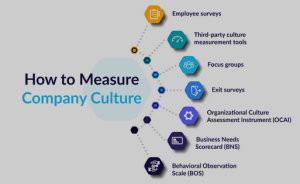Measuring and assessing organizational culture involves evaluating the shared values, beliefs, behaviors, and norms that define the work environment. Organizations often use various methods and tools to understand their culture, identify areas for improvement, and align culture with strategic goals. Here are common approaches and techniques for measuring and assessing organizational culture:

Measuring and Assessing Organizational Culture
-
Table of Contents
ToggleEmployee Surveys:
- Purpose: Employee surveys collect feedback on perceptions of the organizational culture.
- Content: Include questions related to values, communication, leadership, teamwork, and overall satisfaction.
- Analysis: Analyze survey results to identify trends, strengths, weaknesses, and areas for improvement.
-
Focus Groups:
- Purpose: Gather qualitative insights by conducting discussions with small groups of employees.
- Content: Discuss specific aspects of the organizational culture, allowing participants to share their experiences and perspectives.
- Analysis: Summarize themes and patterns from focus group discussions.
-
Interviews:
- Purpose: Conduct one-on-one interviews with employees, leaders, and key stakeholders.
- Content: Explore individual perceptions of the organizational culture, leadership, and values.
- Analysis: Identify common themes and gather in-depth insights.
-
Observation and Shadowing:
- Purpose: Observe daily activities, interactions, and behaviors in the workplace.
- Content: Pay attention to communication styles, collaboration, decision-making processes, and other observable cultural elements.
- Analysis: Evaluate observed behaviors against desired cultural attributes.
-
Cultural Assessment Tools:
- Purpose: Use established tools designed to assess organizational culture.
- Examples: Denison Organizational Culture Survey, Organizational Culture Assessment Instrument (OCAI), Competing Values Framework (CVF).
- Analysis: These tools provide a structured framework for evaluating cultural dimensions and identifying areas for improvement.
-
Cultural Audits:
- Purpose: Conduct an in-depth analysis of various aspects of the organizational culture.
- Content: Assess cultural elements, including leadership styles, communication channels, decision-making processes, and employee engagement.
- Analysis: Evaluate the alignment between current and desired culture and identify gaps.
-
Performance Metrics:
- Purpose: Analyze organizational performance metrics to indirectly measure cultural health.
- Content: Include indicators such as employee turnover rates, absenteeism, customer satisfaction, and productivity.
- Analysis: Identify correlations between performance metrics and cultural factors.
-
Ethnographic Research:
- Purpose: Conduct in-depth, immersive studies to understand the culture from an insider’s perspective.
- Content: Engage in prolonged observations, interviews, and interactions with employees.
- Analysis: Develop a rich understanding of cultural dynamics and identify opportunities for improvement.
-
Storytelling and Artifacts Analysis:
- Purpose: Explore organizational stories, symbols, and artifacts that represent the culture.
- Content: Analyze storytelling, rituals, office layouts, and other symbolic elements.
- Analysis: Assess the cultural messages conveyed through stories and artifacts.
-
Benchmarking:
- Purpose: Compare the organization’s culture against industry benchmarks or best practices.
- Content: Identify cultural attributes that contribute to success in the industry.
- Analysis: Evaluate the organization’s culture in comparison to benchmarks and identify areas for improvement.
-
360-Degree Feedback:
- Purpose: Gather feedback from employees, peers, supervisors, and subordinates about an individual’s behavior and leadership style.
- Content: Include questions related to cultural alignment, teamwork, and leadership effectiveness.
- Analysis: Identify patterns in feedback to assess cultural aspects at different organizational levels.
-
Pulse Surveys:
- Purpose: Conduct short, frequent surveys to capture real-time insights into the organizational culture.
- Content: Include specific cultural dimensions or focus areas.
- Analysis: Monitor trends and make timely adjustments based on ongoing feedback.
When measuring and assessing organizational culture, it’s important to combine multiple methods to gain a comprehensive understanding. Regular assessments help organizations track changes, align culture with strategic goals, and foster a positive and healthy work environment. Additionally, involving employees in the assessment process promotes transparency, trust, and commitment to cultural improvement.
